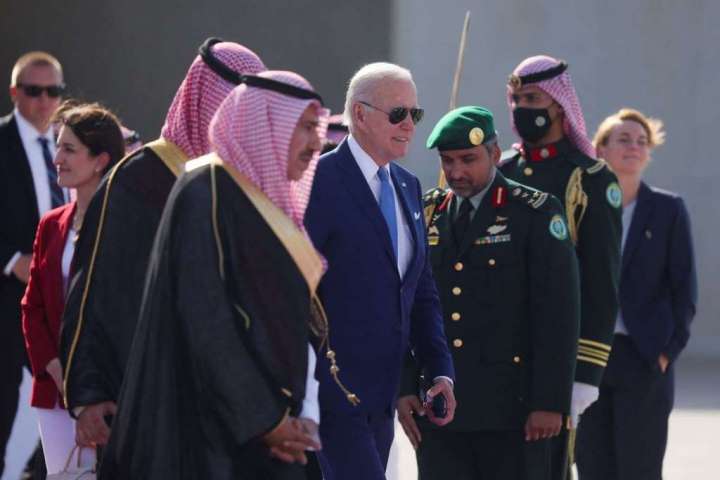It was the fist bump that sent shock waves around the world.
Cut Biden some slack. U.S. presidents have to deal with dictators.

I, too, recoiled at first from that distasteful image. But then I recalled that MBS is hardly the first, or even the worst, despot that U.S. presidents have greeted in similar ways. Harry Truman shook hands with Joseph Stalin, Richard Nixon with Mao Zedong — and both of those dictators had far more blood on their hands than MBS. Columnists can hurl thunderbolts of outrage from on high, but moral purity is a luxury that no leader of a great nation can afford. Every president has to pursue both America’s ideals and its interests — and often they are at odds.
In the case of the Saudis, we simply don’t have the luxury of completely isolating one of the world’s largest oil producers. If the United States won’t support the Saudis, Russia and China will — and they will care far less about human rights than we do. There is a great deal that the Saudis can do to further U.S. interests, from raising oil production (which would help bring down inflation and weaken Russia) to recognizing Israel (which would lessen regional tensions and buttress the alliance against Iran). It is unclear how much Biden got out of his trip, but the effort is worth making — and there are a few welcome signs of progress, such as the Saudis allowing flights from Israel.
Follow Max Boot‘s opinions
FollowIn truth, MBS is a more ambivalent figure than the cartoon villain that he is so often made out to be in media coverage. It’s true that he is cruel and repressive. He has created a climate of fear in Saudi Arabia, imprisoned dissidents and accumulated absolute power. But, while illiberal politically, he is liberalizing Saudi society. (I recommend Graeme Wood’s article in the Atlantic on the changes taking place.)
The once-feared religious police have been largely sidelined. Women are allowed to drive, to travel without a male guardian and to live by themselves. Men and women can dine together in restaurants. Tourists are welcome for the first time. Theaters and concerts have been opened.
For those of us who have visited Saudi Arabia in the past and found it to be one of the weirdest and most repressive places on the planet, these reforms are nothing short of revolutionary. For goodness’ sake, a government-sponsored music festival in December had tens of thousands of young Saudis dancing and partying for four days. That would have been unimaginable a few years ago.
What makes MBS such a confounding figure is that, at the same time he is liberalizing Saudi society, he is repressing liberal reformers. The murder of Khashoggi is but the most gruesome manifestation of this vile policy. There is also the notorious case of Loujain al-Hathloul, an activist who campaigned for women’s right to drive and go out in public without a male relative. As noted by the Atlantic, the Saudis threw her in jail — where she was allegedly tortured and threatened with execution — after MBS announced the imminent end of both policies in 2018.
MBS is reminiscent of other autocratic reformers, such as Turkey’s Mustafa Kemal Ataturk and the shah of Iran, who used their iron grip to modernize traditional Muslim societies. The crown prince’s calculation seems to be that allowing any challenges to his rule could lead to the collapse of a reform movement that is unpopular with many in a conservative society — and he could be right.
There is no easy way to deal with such a complicated figure whose legacy is so mixed. Biden cannot afford to go to the extreme of cynically, uncritically embracing MBS, as then-President Donald Trump and his son-in-law Jared Kushner did. (By an odd coincidence, six months after leaving office, Kushner secured a $2 billion investment from a public wealth fund led by none other than MBS.) But nor can Biden simply cut off the Saudis, as human rights campaigners demand.
He is muddling through by meeting with MBS while raising the issue of Khashoggi’s murder. (Whether he actually called out the prince to his face for being responsible, as he claimed, remains unclear.) More broadly, he is making clear that the United States values its alliance with Saudi Arabia but would like it to curb human rights abuses.
That is not very satisfying or sexy, but I don’t have a better alternative. I’m not sure anyone does. Sometimes there simply isn’t a perfect policy, and the best a president can do is try to pursue the least-bad approach. That’s what Biden is doing, and, while it might be morally satisfying to castigate him, I’m inclined to cut him some slack.






